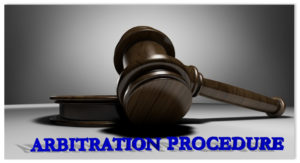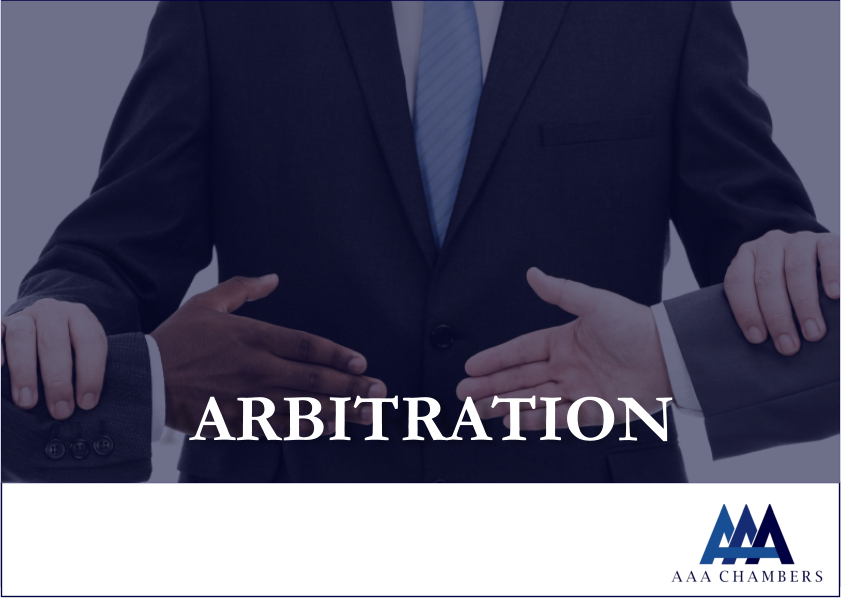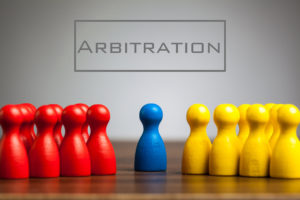By Patrick Mgbeoma Esq., Senior Associate – AAA Chambers
Mike and Ted are best friends who intend entering a business relationship. In order not to cause a strain in their cordial relationship, they inserted an Arbitration clause in their contractual agreements to forestall a situation where any of them will have to approach the Court of law to settle any dispute that may arise. Presently, Mike has breached the contractual obligation to his friend -Ted and instead of the usual protracted Court cases, Ted has decided to enforce the Arbitration clause by commencing an Arbitral proceeding, so as to ensure that their business relationship is resolved without affecting their cordiality as friends.
Introduction
Arbitration is one of the alternative dispute resolution mechanisms just like Conciliation and Mediation, usually party driven to ensure that parties personally oversee the settlement of their dispute and ultimately abide with the Awards and settlements that arise from the procedure for settlement adopted by them.
Arbitration and Other Related Terms
These other terms are closely attributed to Arbitration because they are also Alternative Dispute Resolution mechanisms other than Litigation
- Mediation: Mediation is a process in which a neutral and impartial third party called the mediator is invited by the disputing parties to facilitate the resolution of the dispute. The mediator facilitates communication, promotes understanding, focuses the parties on their interests and uses creative problem-solving techniques to enable the parties to reach their own mutual settlement/agreement.
- Negotiation: this is a problem-solving process in which the parties to a conflict or an imminent conflict voluntarily come together either personally or by their representatives to discuss their differences and attempt to reach a joint decision or resolution of the conflict, on their own and without the involvement of a third party.
- Conciliation: Conciliation has a lot of similarities to mediation. However, while mediation has no statutory protection, conciliation is statutorily protected and regulated by the Arbitration and Conciliation Act (ACA). Conciliation is a system of ADR where a third party known as the conciliator uses his best endeavours to bring the disputing parties to a voluntary settlement of their dispute.
Applicable Arbitration Laws in Nigeria
The law that governs arbitration in Nigeria is ‘The Arbitration and Conciliation Act 1988′, which is the principal legislation which is the Federal law on arbitration now known as “Arbitration & Conciliation Act, Cap A18 Laws of the Federation of Nigeria (LFN) 2004”- The Act is based on the UNCITRAL Model Law and incorporates the UNCITRAL arbitration rules. Also, the Act ratifies and incorporates the New York Convention on the Recognition and Enforcement of Foreign Arbitral Awards (NYC).
In Lagos state, we have the following:
- The Lagos State Arbitration Law No.10 of 2009 (LSAL) which applies to all arbitrations within the state except where the parties have expressly agreed that another law should apply.
- The Lagos Court of Arbitration Law No.8 of 2009 (LCAL) which establishes a court of arbitration in Lagos State.
Types of Arbitration
In Orojo & Ajomo- “Law and Practice of Arbitration and Conciliation in Nigeria, Professor Ajomo stated that there are 4 different types of Arbitration as follows
- Domestic
- International
- Institutional and
- Ad hoc. There is also what may be described as documents only arbitration.
- Domestic Arbitration – is one between persons resident or doing business is the same country like in Nigeria and the contract is subject to be performed in the same country and subject to the local statute such as the Arbitration and Conciliation Act, Cap A18 Laws of the Federation 2004.
- International Arbitration– arbitration is said to be international if the parties to an arbitration agreement have their places of business in different countries or where the subject matter of the arbitration agreement relates to more than one country or where the parties expressly agree that any dispute arising from the commercial transaction between them shall be treated as an international arbitration.
- Institutional Arbitration – international arbitrations may either be institutional or ad hoc. A number of organizations, located in different countries, provide institutional arbitration services, often tailored to particular commercial needs. The parties provide in their contract for the arbitration to be conducted in accordance with the rules of a named arbitration agency or institution such as International Chamber of Commerce (ICC) International Court of Arbitration in Paris, The London Court of International Arbitration (LCIA), the American Arbitration Association, and domestically, we have the Abuja Multi-Door Courthouse and the Lagos Multi-Door Courthouse.
- Ad Hoc Arbitration – this arises where the parties in their contract agreement do not refer to arbitration under any rules of commercial arbitration administering agency or institution, but is entered into after a dispute has arisen. It is usually more flexible as parties determine the Rules, it is less expensive (as it avoids substantial institutional costs) and more confidential than institutional arbitration.
Statutory Arbitration Clause
- Agreement to Arbitrate is the foundation stone of every arbitration. It is pertinent to note that the arbitral tribunal’s jurisdiction is derived solely from the existence and validity of the agreement of the parties to resort to Arbitration.
- Statutes establishing some bodies also stipulate that disputes between the body and another party shall first be referred to arbitration. Such provision serves as a bar on the right of any of the parties to institute any action in court until the arbitration has been taken and concluded. For example, The United Nations Commission on International Trade Laws (UNCITRAL) Model Arbitration Clause for Contracts states that: “Any dispute, controversy or claim arising out of or relating to this contract, or the breach, termination or invalidity thereof, shall be settled by arbitration in accordance with the UNCITRAL Arbitration Rules.”
Why Arbitration?
- When the subject matter of the dispute is highly technical, arbitrators with an appropriate degree of expertise can be appointed (as one cannot choose “the judge” in litigation).
- Arbitration is often faster than litigation in court.
- Arbitration can be cheaper and more flexible for business.
- Arbitration proceedings and an arbitral award are generally non-public and can be made confidential.

Arbitration Procedure
The procedure is provided for in the Arbitration Rules in the 1st Schedule of the Arbitration & Conciliation Act Cap A18 Laws of the Federation 2004 which shall govern arbitration proceedings, it shall be to the exclusion of the Agreement of the parties.
Notice of Arbitration – Article 3
- Shall be made by the party initiating the Arbitration
- Once it is received by the other party (Respondent) Arbitral proceedings are deemed to have commenced.
Representation – Article 4
- May be done by a Legal Practitioner qualified to practice within the Jurisdiction except the Arbitration Agreement states otherwise.
Composition of Arbitral Tribunal – Section 11 of the ACA
Number of Arbitrators (Article 5)
- Where Parties have not agreed previously or within 15days after receipt of Arbitration Notice by the Respondent, the number of arbitrators have not been determined by the parties, the number of Arbitrators shall be three (3) – Section 6 of the Arbitration And Conciliation Act, 2004.
- But in Lagos State where there is no agreement on the number of Arbitrators, the number shall be one (1) – Section 7(3) of the Lagos State Arbitration Law, 2009.
Appointment of Arbitrators (Article 6-8)
- Parties may propose to the other party names of one or more persons to serve as the Sole Arbitrator
- 30days after receipt of the proposal by the party and parties have not reached an agreement, the sole arbitrator shall be appointed by the court.
- If 3 arbitrators are to be appointed, each party shall appoint one (1) each and the 2 appointed arbitrators shall choose the third Arbitrator who will serve as the presiding arbitrator (Article 7).
Replacement of Arbitrator (Article 13)
- The death, resignation of arbitrators in the course of proceedings, a substitute arbitrator may be appointed as per the procedure for appointment of Arbitrator.
Arbitral Proceedings – Section111 ACA
- Article 15 – provides that arbitral tribunal may conduct the arbitration in a manner it considers appropriate provided parties are treated with equality.
- Article 16 – provides that unless parties have agreed on a place arbitration is to be held, such place shall be determined by the Arbitral tribunal
Statement of Claim – Article 18
Statement of Defence – Article 19
- Within a period of time determined by the Arbitral tribunal, Respondent shall communicate his statement of defence in writing to the claimant and to each of the Arbitrators
- Where there is a counterclaim, it takes the same form and effect as a statement of claim in Article 18
Period of Time – Article 23
- Period of time fixed by the Arbitral tribunal for the communication of written statements including the statement of claim and statement of defence shall not exceed 45days. However, the tribunal may extend the time limit if it concludes that extension is justified
Evidence and Hearing – Article 24 & 25
- Tendering of documents are allowed
- Parties are allowed to call their witnesses as communicated to the arbitral tribunal and the other party, their names and addresses of the said witnesses intended
- A hearing shall be held in camera unless parties agree otherwise for confidentiality sake
- The arbitral tribunal shall determine the admissibility, relevance, materiality and weight attached to the evidence preferred.
Award and Decision – Article 31
- Where there are 3 arbitrators, a decision shall be made by a majority of the arbitrators.
Interpretation of Award – Article 34
- Within 30days after receipt of award, either party with the notice to the other party may request the tribunal to give an interpretation of the award and such interpretation shall be given in writing within 45days after receipt of the request
Correction of Award – Article 36
- Within 30days after the receipt of award, a party with notice to the other party may request the tribunal to correct errors in computation, clerical or typographical errors and the tribunal may within 30days after such communications make such corrections on its own initiative.
Additional Award – Article 37
- Within 30days after receipt of the award, either party with notice to the other party may request the tribunal to make an additional award as to the claim presented but omitted from the award.
- Where tribunal considers the request of an additional award to be justified, such rectification can be made without further hearing and it shall complete the award within 60days.
Enforcement of Arbitral Award
Section 31 of the Arbitration and Conciliation Act Cap A18 Laws of the Federation 2004 makes provisions for the enforcement of the domestic arbitral award and it is provided as follows;
(1) An arbitral award shall be recognized as binding and subject to this section 32 of this Act, shall, upon application in writing to the court, be enforced by the court.
(2)The party relying on an award or applying for its enforcement shall supply-
(a)The duly authenticated original award or duly certified copy thereof;
(b)The original arbitration agreement or a duly certified copy thereof.
(3) An award may, by leave of the court or a judge, be enforced in the same manner as a Judgment or Order to the same effect.
Enforcement of Foreign Arbitral Awards
While Section 32 makes provision for the challenge of both domestic and foreign arbitral award, section 51 of the Arbitration Act provides a unified legal framework for recognition and enforcement of arbitral awards of both local and foreign arbitral awards as it provides thus;
(1) An arbitral award shall, irrespective of the country in which it is made, be recognized as binding and subject to section 32 of this Act, shall, upon application in writing to the court, be enforced by the court.
(2) The party relying on an award or applying for its enforcement shall supply
(a) The duly authenticated original award or a duly certified copy thereof;
(b) The original arbitration agreement or a duly certified copy thereof; and
(c) Where the award or arbitration agreement is not made in the English language, a duly certified translation thereof into the English language
In the case of IMANI & SONS LTD. v. BIL CONSTRUCTION CO. LTD (1999) NWLR 12 (Pt. 630) page 253 at 263, the Court of Appeal held that in addition to the motion on notice filed by the party seeking enforcement, the party also needs to provide the following simple requirements;
(1) Arbitration Agreement;
(2) The Original Award;
(3) The name and last place of business of the person against whom it is intended to be enforced;
(4) Statement that the award has not been complied with, or complied with only in part
Also in the case of EBOKAM v. EKWENIBE & SONS TRADING COMPANY (2001) NWLR 2 (Pt. 696) page 32, the Court of Appeal listed additional requirements needed for a party seeking recognition and enforcement under the New York Convention. The requirements are as follows;
1. The arbitration agreement;
2. That the dispute arose within the terms of the submission;
3. That arbitrators were appointed in accordance with the clause which contains the submission;
4. The making of the award; and
5. That the amount awarded has not been paid.
Once the Court recognizes the award by granting leave to the creditor to register same, it shall be enforced as a judgment of that Court.
There are two (2) other ways to recognize Arbitral awards in our Jurisdiction, which are ;
UNDER THE REGISTRATION OF FOREIGN JUDGMENTS STATUTES
The Foreign Judgments (Reciprocal Enforcement) Act, Cap F35, Laws of the Federation of Nigeria, 2004 regulates the registration of foreign judgments in Nigeria. For an award to be recognized under these legislations, it must be registered in the court of the country where it was made and become enforceable in the same manner as a judgment given by the court in that jurisdiction. In Tulip Nig. Ltd v Noleggioe Transport Maritime S.A.S, (2011) NWLR 4 (Pt.1237), 254, the Court held as follows:
i. The provisions of the Reciprocal Enforcement of Judgment Ordinance Cap 175 LFN 1958 and the Foreign Judgment (Reciprocal Enforcement) Act 1990 will apply in the enforcement of foreign arbitral award where same has been elevated to the status of a judgment by leave of the High Court been sought and obtained.”
ACTION UPON AWARD
Arbitral awards can be enforced by commencing an action upon the award. In the case of a foreign award, it is inconsequential whether there is reciprocal treatment in the country where the award was obtained or not. In TOPHER INC. OF NEW YORK v EDOKPOLOR (TRADING AS JOHN EDOKPOLOR & SONS) (1965) 1 All NLR 1, 307, The Supreme Court held as follows:
i. A party is not prevented from suing upon a foreign judgment regardless of whether there is a reciprocal treatment in the country where it is obtained if no order is made under section 124 to modify that position.
ii. A suit brought upon a foreign award ought not to be struck out merely on the ground that there must be a treaty guaranteeing reciprocal treatment in the country where it was made or an Order in Council to that effect”
The Principle in Topher’s case is based on the Doctrine of Obligation which postulates that if a foreign court of competent jurisdiction has adjudicated a certain sum to be due from one person to another, the liability to pay that sum becomes a legal obligation enforceable domestically by a debt action.
Challenges of Arbitration
The modern-day arbitral process has lost its early simplicity. It has become more complex, more legalistic, more institutionalized. It has become a common postulation that arbitration increasingly resembles litigation, particularly the fact that arbitral institutions have over the years evolved rules of procedure somewhat akin to High Court procedural rules. More regard is now given to form rather than content. Arbitral proceedings have become more and more similar to litigation but we cannot over-emphasize its relevance in national and international commercial transactions.
Conclusion
In spite of all the attendant problems associated with arbitration practice in Nigeria today, arbitration has come to stay as a veritable tool for alternative dispute resolution. Finally, in Nigeria, arbitration is still very relevant as a dispute resolution mechanism especially in domestic and international commercial transactions, and if its advantages are properly harnessed, will decongest the perpetually congested cause lists in our courtrooms.
Definition of Terms
- HALSBURY’S LAWS OF ENGLAND, 3rd Edition, Vol. 2, page 2 defines Arbitration as follows:
“An arbitration is the reference of a dispute or difference between not less than two parties for determination, after hearing both sides in a judicial manner, by a person or persons other than in court of competent jurisdiction.”
- While BLACK’S LAW DICTIONARY, 7th Edition, page 132 defined Award to mean:
“A final judgment or decision, especially one by an arbitrator or by jury accessing damages.” – Also termed Arbitrament
- While page 100 defined an “Arbitrator” to be;
“A neutral person who resolves a dispute between parties, esp. by means of formal arbitration.
UNCITRAL Model Laws – UNCITRAL means United Nation Commission on International Trade Laws; which was introduced by the United Nation’s General Assembly by Resolution 2205 (XXI) of 17th December 1966 – to harmonize international trade laws on commercial transactions.



cialis canada over the counter [url=https://cialishav.com/ ]buy cialis shipment to russia[/url] cialis and lisinopril